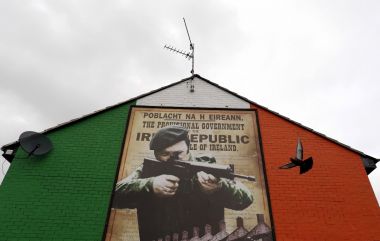Bishop of Derry sees lessons from Catholic Church in approach to NI Troubles

Last week, the UK government revealed controversial proposals for preventing any further criminal prosecutions and inquests, as well as civil cases and Police Ombudsman investigations, arising from the Troubles in Northern Ireland between 1969 and 1998.
An announcement about this in Parliament by the Minister, Brandon Lewis, last Wednesday was accompanied by the publication of a 32-page command paper, citing the "difficulty of securing criminal justice outcomes" and costs to the public purse of legal aid.
The document points out that "over 3,500 people were killed during the Troubles, almost one third of whom were members of the security forces."
Following the collapse in May of the trial of two former paratroopers for murder on 'Bloody Sunday' in January 1972, criminal cases against two other soldiers for killings that year were discontinued earlier this month.
According to Irish Foreign Minister Simon Coveney, writing in the Guardian, the UK's current proposals amount effectively to "an unconditional amnesty". This "would not have the support of the political parties in Northern Ireland" or "of those representing the bereaved families left behind by conflict in Ireland, north or south, or in Britain".
He added, "Whether the person who killed their loved one was a soldier or a member of a paramilitary organisation, every family bereaved in the conflict must have access to an effective investigation and to a process of justice, regardless of the perpetrator."
In their 2014 Stormont House Agreement, the UK and Irish governments, together with Northern Ireland's political parties, committed jointly to addressing the legacy of the Troubles by respecting certain principles, including "upholding the rule of law" and "addressing the suffering of victims and survivors", as well as compliance with human rights.
Article 13 of the European Convention on Human Rights guarantees an "effective remedy before a national authority" for violations of Convention rights. These include the right to life under Article 2, which imposes a positive obligation on states to protect the lives of citizens from actions not only of states themselves, but also of non-state third parties (para. 15), and to carry out an "effective official investigation" into any violent deaths (paras. 133-134).
The remedy required under Article 13 can include private legal action as well as, or sometimes instead of, criminal prosecutions. Several cases have come before the European Court of Human Rights concerning deaths during the Troubles (paras. 76-77).
Simon Coveney commented further in the Guardian, "We do not believe an approach based on a general statute of limitations would be compatible with the obligations of the European convention on human rights. It would undoubtedly be tested in the courts and if it failed there, it would only add years of uncertainty and misery for families with no benefit ... We will not advance reconciliation by moving away from a commitment to accountability or shying away from difficult truths."
This last sentiment was in part echoed by the Catholic Bishop of Derry, Bishop Donal McKeown, in his Sunday homily this week.
Whilst firmly rejecting "heroic" narratives of violence, Bishop McKeown also drew a striking parallel between historical child abuse in his own Church and the legacy of hurt from the Troubles: "We have so many people in our city, in our country, who are hurting after the Troubles here. And in every conflict, the majority of those who died were not combatants, but bystanders, civilians. So many deaths of innocent people may be an embarrassment to those who are responsible for their death. But their deaths and injury have scarred thousands down through the generations, some of whom dare not speak about their loss, because it would undermine narratives about heroic warriors.
"We know from Church life that there's a temptation to hide uncomfortable truths. Dark secrets are always unwelcome. But the effect of current government proposals on legacy is to prevent too much prying into dark corners of a dirty war. That will protect reputations, but will not help the hurting little ones for whom Jesus was and remains most concerned. Any system that appears to prioritise the feelings of the perpetrators over the distress of the victims is guaranteed only to perpetuate the pain, not draw a line under it. Just because some powerful people prefer to keep some truths hidden is no reason for civic leadership to facilitate that.
"Just as the abuse of children over half a century ago should be investigated to see what can be learnt, so too the killing of innocent men, women and children should not be locked away beyond prying eyes.
"We have to proclaim and show that divine pity is more important than political propriety."











